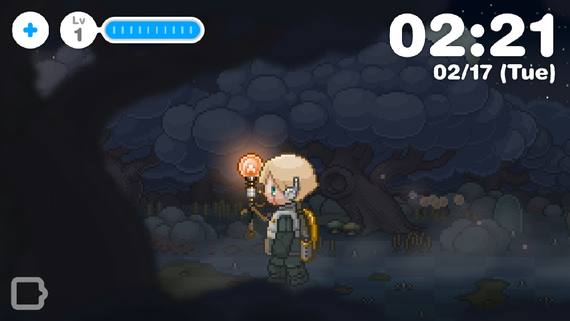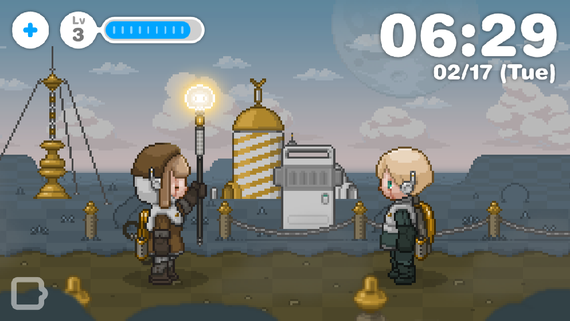A major part of the experience of playing video games is, as anyone with an older sibling can tell you, watching someone else play video games.
And maybe that's why Dreeps, the new iOS game that plays itself, feels not all that weird. The game's creators call it an "alarm playing game," because setting an alarm is the only thing you actually ever do in the game. Other than that, Dreeps is about watching action unfold. The game tells the story of a little robot boy making his way through a variety of landscapes and vanquishing enemies. The game continues whether or not you're paying attention to it. Most of the time, the little robot boy is calmly walking across the screen.

But open the app at the right moment and you'll catch him fighting off a bad guy.

Or getting healing power from a nice elf type.

"In dreeps, you will just have to set the alarm, that’s all," wrote the game's designers on the Dreeps website. "You can have a look at the adventure on the phone put on you desk while working, during snack time, just enjoy the game at your pace... You might be missing some events, but don’t mind about it. There’s almost no text in the game. You can imagine your own version of the story with the hints hidden in visuals and sound." The game costs $2.99 to download.
The action is fairly limited, but Dreeps is charming—and actually kind of compelling in its own way. Maybe that shouldn't be a surprise. Plenty of designers have gamified the passage of time itself. Adult Swim's Hemp Tycoon, a quasi Sim Cityesque game about harvesting marijuana, requires players to tend to their crops—but it's mostly about waiting around for the plants to grow. And the real-time gameplay in The Sims was part of what made it so popular (and so addicting) when it came out in 2000. Watching a robot do what it was programmed to do may not be the traditional way we think about games, but, as the video game designer Jesse Schell told me a few years ago, "algorithms are part of what make games what they are."
Outside the gaming community, Schell is probably best known for series of talks he gave in 2010 about gamification and what he calls the Gamepocalypse. "The idea of the Gamepocalypse," he said in a Long Now Foundation talk that year, "that is when every second of your life, you're actually playing a game in some way." Here's a typical morning in Schell's vision of the fully gamified future:
Imagine that some time in the near future, that you wake up in the morning and you go to brush your teeth and your toothbrush has inexpensive sensors on it and it's wifi-connected because it's really cheap to do that. And so, you go to brush your teeth and it's like, 'Good job, here's some points for brushing your teeth.' And, of course, once you brush your teeth a full three minutes, more bonus points because that's the appropriate amount of time to brush your teeth.
And, hey, you brushed your teeth every day this week, twice a day, more bonus points for you. And you can use these bonus points on discounts on toothpaste and things you're going to buy anyway at the grocery store. And it sounds stupid. Who would do this? Why? Well, the toothbrush people know the more you brush your teeth, the faster you use toothpaste, the faster you use toothbrushes, the more you're going to buy. They're going to want to incentivize you to do it.
So from a player's standpoint, Dreeps may look like it's more parts alarm clock than it is game—though, it should be noted, the alarm clock functionality isn't totally intuitive or reliable—but Dreeps mostly stretches the boundaries of what a game can be at a time when games are, increasingly, everywhere.
This article was originally published at http://www.theatlantic.com/technology/archive/2015/02/a-video-game-that-plays-itself/385548/
